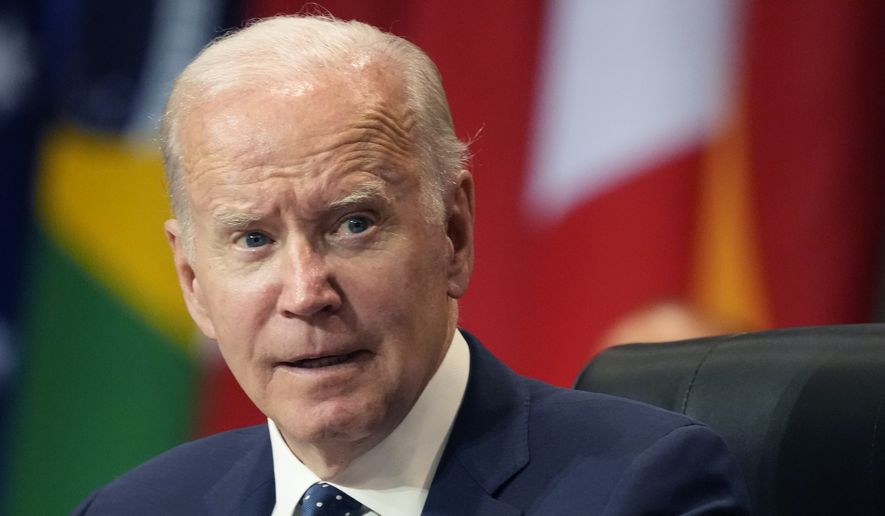President Biden’s shift on energy and foreign policy has sparked outrage. Critics are accusing the administration of hypocrisy for promoting a green agenda domestically while lifting oil sanctions on an adversary and allowing Chevron to resume production in Venezuela.
The Treasury Department branded the move as “important steps in the right direction to restore democracy in the country.” The White House insisted it had nothing to do with trying to lower inflated gasoline prices. Republicans found the explanation hard to believe.
“We have ample, untapped natural resources to make the U.S. energy independent,” tweeted Sen. James Risch of Idaho, the ranking Republican on the Senate Foreign Affairs Committee. “The President simply refuses to use them.”
“Building Venezuela Back Better,” tweeted Rep. Matt Gaetz, Florida Republican.
The Treasury Department granted a license to Chevron to pump Venezuelan oil in partnership with the country’s state-run oil company that will need to be renewed every six months, marking the first time the company can operate there since the Trump administration implemented sanctions in a bid to oust its dictatorship.
The policy shift was also the latest example of how Mr. Biden has struggled to balance priorities when it comes to tackling climate change and soaring energy costs.
The sanctions relief was prompted by Venezuelan President Nicolás Maduro and the opposition party reaching an agreement on $3 billion in humanitarian aid using funds unfrozen by the U.S. and to continue talks to reform Venezuela’s political system.
The Chevron license stipulates that the far-left regime is prohibited from receiving any of the oil profits and that any production must be sold to the U.S.
Democrats and climate activists, meanwhile, were largely silent on the administration’s move, despite advocating for the U.S. to curb its fossil fuel production at a time when White House officials have called on the industry to produce more. The lifting of oil sanctions is expected to have minimal impact on the oil markets, a notion that the White House has conceded.
Chevron CEO Mike Wirth has cautioned that it would take months or more to resume production in already-existing Venezuelan oil fields, and the roughly 200,000 barrels of oil per day that the company produced with Venezuela’s state-run oil firm prior to the sanctions in 2019 are just a fraction of the nearly 20 million barrels that are consumed daily in the U.S.
Senate Foreign Relations Committee Chairman Robert Menendez, New Jersey Democrat, offered cautious optimism while avoiding direct mention of Chevron.
“If Maduro again tries to use these negotiations to buy time to further consolidate his criminal dictatorship, the United States and our international partners must snap back the full force of our sanctions that brought his regime to the negotiating table in the first place,” he said in a statement over the weekend.
Analysts have said that after another strong showing by the GOP in Florida during the midterms, the Republicans’ hold on the Sunshine State helps explain Mr. Biden’s latest policy shift. Because Florida is no longer considered a swing state, its large population of anti-socialist Latinos holds much less political sway.
“The Biden administration’s decision to ease sanctions on the Venezuelan oil sector prioritizes U.S. geostrategic interests over domestic political pressure,” the Atlantic Council’s Diego Area wrote in a blog post.
The research firm ClearView Energy Partners said as much, writing in a note that following “decisive re-election victories by Florida Republicans like Governor Ron DeSantis and Representative María Elvira Salazar (who represents a significant Venezuelan diaspora), Democrats may see little political upside in keeping a hard line against Caracas when crude supplies are tight.”
Rep. Mario Diaz-Balart, a Florida Republican whose South Florida district stretches to both coasts and includes part of Miami, described the latest move by Mr. Biden as “unconscionable.”
“It’s unconscionable that the Biden Administration canceled the Keystone Pipeline and banned CLEANER domestic production in North America only to give the green light to pump blood oil from #Venezuela, further enriching Maduro’s narco-terrorist regime,” he tweeted.
• Ramsey Touchberry can be reached at rtouchberry@washingtontimes.com.




Please read our comment policy before commenting.